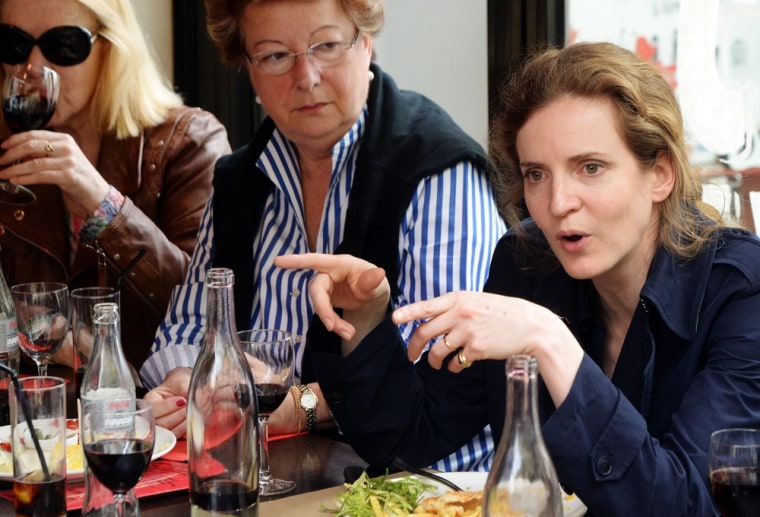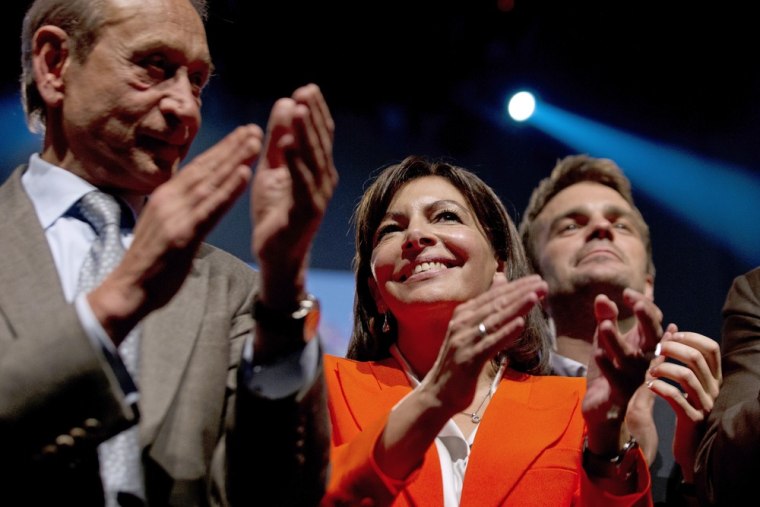
PARIS -- The politician known as “NKM” is a rising star in France - a tough, military-trained engineer first elected to the National Assembly at the age of just 29 and tipped by some as a future president.
And what is all-the-more remarkable about Nathalie Kosciusko-Morizet is that she has managed to fight her way through the rampant sexism of French politics.
She was twice told by two of her own party’s leaders that she’d missed out on becoming a government minister because she was pregnant.
When first elected, staff at the entrance to the National Assembly used to assume her male assistant was in fact the lawmaker, instead of her.
Politics in France has long been a “boys’ club” where the few women who dare to enter soon discover they are unwelcome.
But there are signs of change. Kosciusko-Morizet, of the center-right Union pour un Mouvement Populaire, is running to become the mayor of Paris. Her main rival is another woman, Anne Hidalgo, of Parti Socialiste. Being in charge of the city of more than 2 million is widely seen as a path to the presidency.
Marielle de Sarnez, of the centrist Mouvement Démocrate, and the Green candidate – possibly a fourth woman, party leader Cecile Duflot -- are likely to fight for third place against candidates from several smaller parties.
In an interview in her office at the National Assembly, Kosciusko-Morizet made clear she embraced her reputation as a tough operator.
“I am a killer … everybody is a killer in politics. Some know how to shoot, some do not. Some do that [shoot] in your face, most of them do that in your back. I do that in the face,” she said.

“That’s why they say I’m a killer. It’s been a problem sometimes in my political life. I do say face-to-face what I think of people.”
She said politicians who claimed to be “little teddy bears” were not being truthful. “Liar one day, liar every day.”
Asked whether she wants to be president, she replied "politicians that say they have no ambitions are a little ridiculous, but ... my obsession today is the battle of Paris."
Kosciusko-Morizet, now 40 and married to a former Socialist politician, said her gender had played a part when she twice missed out on jobs as a government minister.
“I have two children and on each occasion, on each pregnancy, I lost an opportunity for being a minister,” she said. “And I was told that, which is strange.”
“On both occasions, I had men calling me – the president of the republic [then Jacques Chirac] and the second time the prime minister [then Francois Fillon] – and saying ‘well, you won’t be a minister because you are pregnant.’”
“They don’t realize what they are saying and, in fact, I’m not sure it was a real reason. I’m sure they had other reasons. [But] in their view, this reason was a good one.”
Kosciusko-Morizet stressed she had nothing personal against Chirac or Fillon.
She was less forgiving when asked about men like Dominique Strauss-Kahn, once a serious contender to be the Socialist candidate for president of France.
His career was cut short by later-dropped accusations that he sexually assaulted a maid in a New York hotel and subsequent revelations that he went to swingers’ parties also attended by prostitutes. He faces a criminal trial for "aggravated pimping" over the latter claim.
“This is the type of man against which women of my age have to fight for women aged 20 not to have a problem and not to feel this type of attitude,” Kosciusko-Morizet said.
“I’m 40, I have two kids, I know very well how to throw away this type of man. But I consider this a problem for younger women, for the ones that want their first job.”
Chirac reportedly called her “l'emmerdeuse” – meaning troublemaker or “pain in the neck.” When she asked him about the remark, he perhaps sensibly insisted he had been misquoted, but she took it as “a compliment” anyway.
She later served as a minister in several roles -- environment, transport and digital economy – and was President Nicolas Sarkozy’s spokeswoman in his unsuccessful 2012 re-election campaign.
Kosciusko-Morizet is a fan of the United States, saying it’s a “perpetual source of inspiration.” Her grandfather Jacques Kosciusko-Morizet was French ambassador to the U.S. in the 1970s, she has several American relatives and she went to Cheley Camps near Pittsburgh for several summers in her youth.
She supported France's decision not to take part in the Iraq War, but said she had “suffered” amid the "painful" anti-French coverage in the U.S. media.
Her rival Hidalgo agreed French politics had “for a long time been the sole domain of men and we women continue to suffer the consequences today.”
“It is still more difficult to speak up when one is a female politician because of numerous prejudices that unfortunately still exist in French society,” she said.
“I, myself, have recently been a victim of macho, verbal aggression. A departmental mayor, Jean Francois Legaret, … called me a ‘potiche’ [a derogatory term for a housewife] last February. These are unacceptable expressions,” she added.
Hidalgo said women in politics had to “work ten times harder, in order to prove that they are as competent and solid as men.”
“Being the first female mayor of Paris will be a big symbol and a very positive sign for women who wanted to go into politics but who daren’t go into it in the past,” she said. “Paris is ready for such a change and I’m sure that France could one day elect a woman as president.”
But, in a swipe at Kosciusko-Morizet, Hidalgo said her ambition was to be mayor of Paris, not president at France. “I do not see it as a trampoline to propel myself towards the national political responsibilities,” she said.
Gael Sliman, deputy chief executive officer of polling company BVA Opinion, said Hidalgo was the slight favorite to win the spring 2014 election for Paris mayor, but described Kosciusko-Morizet as a “good challenger.”
“In the surveys that have been conducted since the past six months, she [Hidalgo] is always winning, but there’s not a huge difference between her and NKM. The gap is quite short,” he said. “It will be very interesting. It’s not done yet.”
Political analyst Nicole Bacharan, a fellow at the Fondation Nationale des Sciences Politiques, said that male politicians were “having a very hard time making room for women.”
“They have managed to remain a boys’ club for a very long time, much longer than in Anglo-Saxon countries,” she said. “We’re a Latin country with a really hard, male-domination tradition. As soon as any kind of profession becomes more female, it’s valued less, it’s paid less.”
But she said sexism in politics was diminishing with the younger generation considering such attitudes unacceptable.
Bacharan said Kosciusko-Morizet and Hidalgo, currently deputy mayor, were “physically attractive, beautiful women” who “manage to be taken seriously.”
“Mayor of Paris is a stepping stone [to the presidency] definitely," she added. "Everyone knows NKM has presidential ambitions."